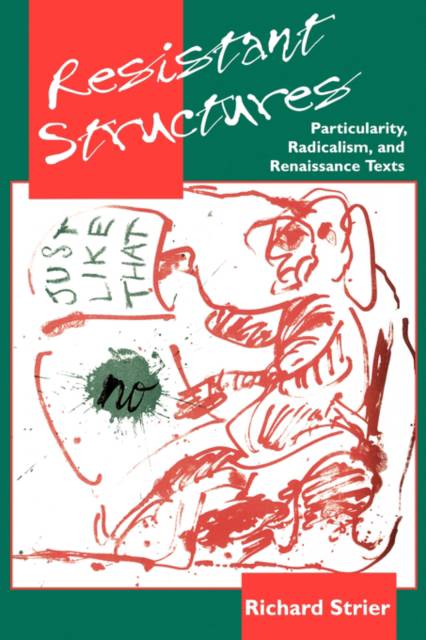
- Afhalen na 1 uur in een winkel met voorraad
- Gratis thuislevering in België vanaf € 30
- Ruim aanbod met 7 miljoen producten
- Afhalen na 1 uur in een winkel met voorraad
- Gratis thuislevering in België vanaf € 30
- Ruim aanbod met 7 miljoen producten
Zoeken
€ 57,95
+ 115 punten
Omschrijving
Taking Wittgenstein's "Don't think, but look" as his motto, Richard Strier argues against the application of a priori schemes to Renaissance (and all) texts. He argues for the possibility and desirability of rigorously attentive but "pre-theoretical" reading. His approach privileges particularity and attempts to respect the "resistant structures" of texts. He opposes theories, critical and historical, that dictate in advance what texts must--or cannot--say or do.
The first part of the book, "Against Schemes," demonstrates, in discussions of Rosemond Tuve, Stephen Greenblatt, and Stanley Fish among others, how both historicist and purely theoretical approaches can equally produce distortion of particulars. The second part, "Against Received Ideas," shows how a variety of texts (by Shakespeare, Donne, Herbert, and others) have been seen through the lenses of fixed, mainly conservative ideas in ways that have obscured their actual, surprising, and sometimes surprisingly radical content.
The first part of the book, "Against Schemes," demonstrates, in discussions of Rosemond Tuve, Stephen Greenblatt, and Stanley Fish among others, how both historicist and purely theoretical approaches can equally produce distortion of particulars. The second part, "Against Received Ideas," shows how a variety of texts (by Shakespeare, Donne, Herbert, and others) have been seen through the lenses of fixed, mainly conservative ideas in ways that have obscured their actual, surprising, and sometimes surprisingly radical content.
Specificaties
Betrokkenen
- Auteur(s):
- Uitgeverij:
Inhoud
- Aantal bladzijden:
- 256
- Taal:
- Engels
- Reeks:
- Reeksnummer:
- nr. 34
Eigenschappen
- Productcode (EAN):
- 9780520209053
- Verschijningsdatum:
- 31/03/1997
- Uitvoering:
- Paperback
- Formaat:
- Trade paperback (VS)
- Afmetingen:
- 153 mm x 230 mm
- Gewicht:
- 394 g

Alleen bij Standaard Boekhandel
+ 115 punten op je klantenkaart van Standaard Boekhandel
Beoordelingen
We publiceren alleen reviews die voldoen aan de voorwaarden voor reviews. Bekijk onze voorwaarden voor reviews.











